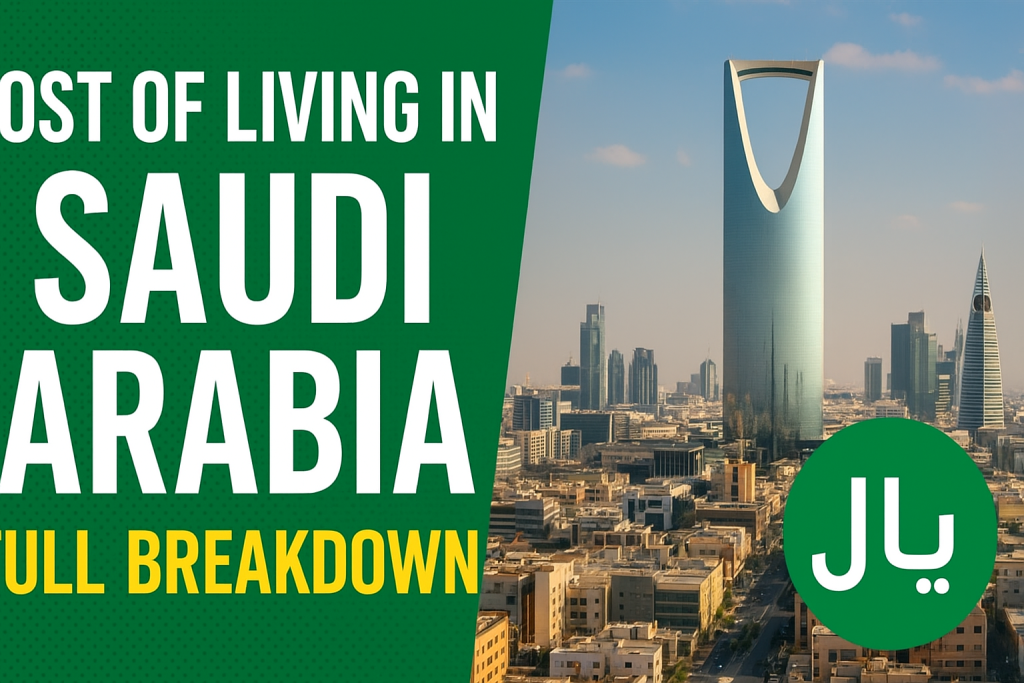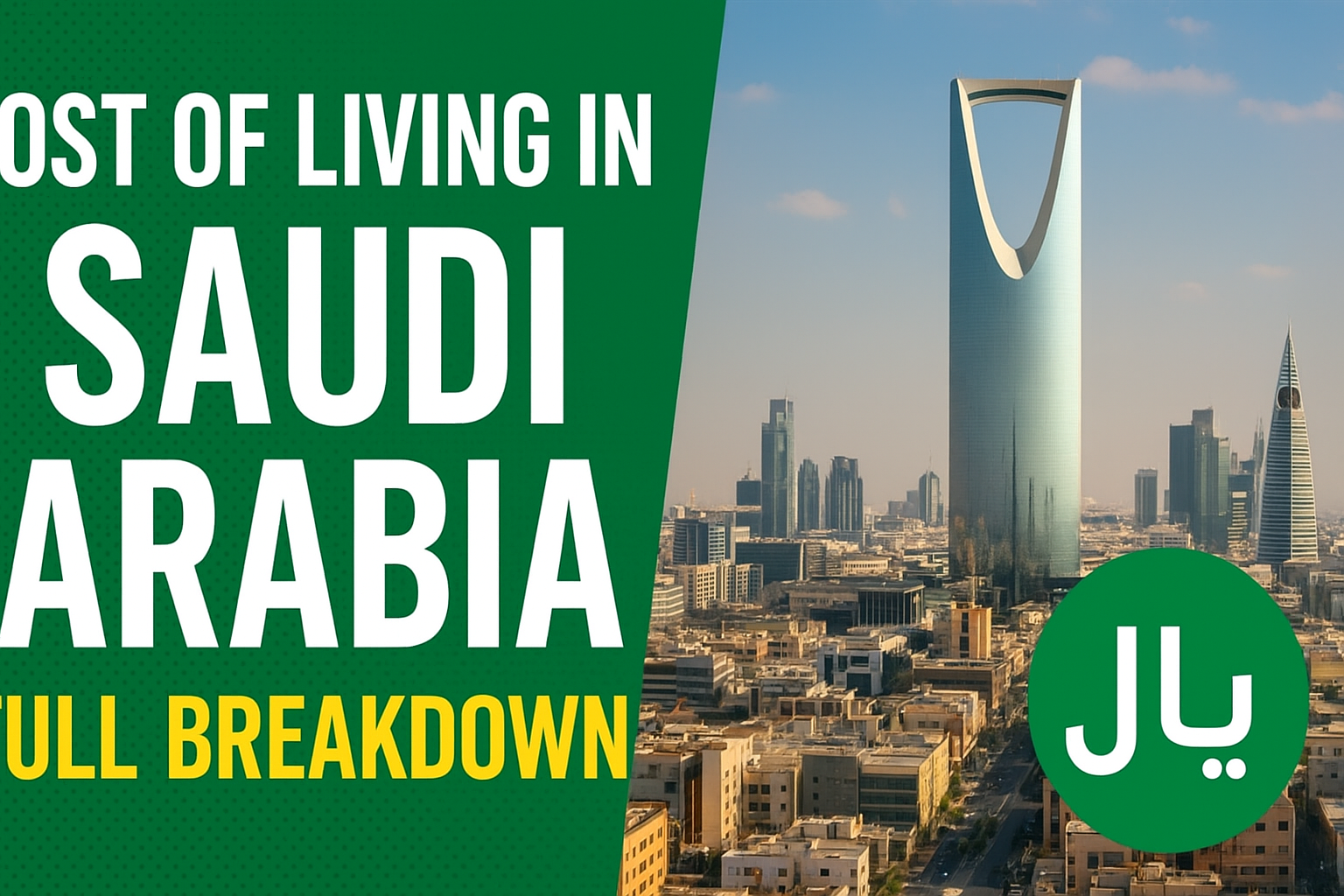Saudi Arabia has long been a popular destination for expats due to its tax-free income, modern infrastructure, and growing job opportunities. But before relocating, understanding the cost of living in Saudi Arabia is essential. Whether you’re planning to work, study, or move with family, this guide breaks down housing, food, healthcare, and daily expenses to help you make informed decisions.
Recommend: Top 10 Reasons Why Living in Saudi Arabia and Life in Saudi Arabia as an Expat
Cost of Living in Saudi Arabia
The cost of living in Saudi Arabia varies depending on the city, lifestyle, and family size. Riyadh, Jeddah, and Dammam are the most popular cities for expats, with Riyadh being slightly more expensive. Compared to Western countries like the UK or the US, Saudi Arabia offers a lower cost of living, especially when factoring in zero income tax.
Here’s a quick look at average monthly expenses (for a single person):
| Category | Estimated Monthly Cost (SAR) |
|---|---|
| Accommodation | 2,000 – 4,000 |
| Food & Groceries | 800 – 1,500 |
| Transportation | 300–700 |
| Utilities & Internet | 400–600 |
| Entertainment & Misc. | 500–1,000 |
| Total (Average) | 4,000–8,000 SAR |
Housing and Rent Prices
Housing is the largest expense for most residents in Saudi Arabia. Rent prices differ significantly across cities.
Average Rent (Monthly)
-
Riyadh: SAR 2,500 – 4,500 (1-bedroom apartment in city center)
-
Jeddah: SAR 2,000 – 3,800
-
Dammam: SAR 1,800–3,000
-
Makkah/Madinah: SAR 2,000 – 3,500
If you move outside city centers or share an apartment, rent can drop by 20–40%. Most compounds offer furnished apartments with amenities like swimming pools, gyms, and security—but at a higher cost.
Tip: Many employers offer housing allowances or company-provided accommodation, which can significantly reduce your expenses.
Food and Grocery Costs
The cost of food in Saudi Arabia depends on your eating habits. Cooking at home is generally more affordable than eating out.
| Type | Average Price (SAR) |
|---|---|
| 1-liter milk | 5 |
| Loaf of bread | 3 |
| 1 kg chicken | 15–18 |
| 1 kg rice | 6–8 |
| Meal at a local restaurant | 25–35 |
| Fast food meal (McDonald’s, KFC) | 30–40 |
| Mid-range restaurant (for 2) | 120–200 |
Popular supermarkets like Panda, Carrefour, Lulu Hypermarket, and Tamimi Markets offer good deals, while imported goods may cost more.
Transportation Costs
Transportation is another factor influencing the cost of living in Saudi Arabia. With well-developed roads and cheap fuel, many residents prefer to drive.
1. Fuel Costs
-
Petrol (1 Liter): SAR 2.18 (approx.)
-
Diesel (1 Liter): SAR 0.75
2. Public Transportation
-
Bus Ticket: SAR 3–6
-
Taxi Start (Normal Tariff): SAR 10
-
Monthly Pass (Bus/Metro in Riyadh): SAR 200–300
Ridesharing apps like Careem and Uber are widely used, especially in major cities.
Owning a car involves costs such as
-
Insurance: SAR 800–1,200/year
-
Maintenance: SAR 100 – 300/month
Utilities and Internet
Utilities include electricity, water, cooling, and internet. Since Saudi Arabia’s climate is hot for most of the year, air conditioning contributes heavily to your bills.
Recommend: How to Get Personal Finance in Saudi Arabia as an Expat
| Utility | Monthly Cost (SAR) |
|---|---|
| Electricity, Water, Gas | 300–500 |
| Internet (Unlimited, 10–30 Mbps) | 250 – 400 |
| Mobile Plan | 100–150 |
Tip: Choose energy-efficient ACs and switch off appliances when not in use to manage power bills efficiently.
Healthcare Costs
Healthcare in Saudi Arabia is of high quality, with both public and private options.
Most employers provide health insurance for employees and their dependents. For those without coverage, private healthcare costs can vary.
| Service | Average Cost (SAR) |
|---|---|
| Doctor Consultation | 150–300 |
| Specialist Visit | 250 – 500 |
| Prescription Medicine | 50–150 |
| Health Insurance | 800 – 1,800/year |
Public hospitals offer free or low-cost treatment for Saudi citizens, while expats usually rely on private healthcare providers.
Education Costs
If you’re moving with family, education is a key factor in the cost of living in Saudi Arabia. While public schools are free for locals, expats generally opt for international schools.
| School Type | Annual Fee (SAR) |
|---|---|
| Preschool / Kindergarten | 10,000–25,000 |
| Primary School | 20,000 – 40,000 |
| Secondary School | 30,000–60,000 |
| University (Private) | 40,000–80,000 |
Recommend: King Salman Park: World’s Largest Park Is Transforming Saudi Arabia
Top cities like Riyadh, Jeddah, and Dammam have international schools following American, British, and Indian curricula.
Entertainment and Lifestyle Expenses
Saudi Arabia has transformed into a vibrant entertainment hub in recent years. From cinemas to concerts and sporting events, there’s always something to do.
| Activity | Average Cost (SAR) |
|---|---|
| Cinema Ticket | 50–70 |
| Gym Membership | 200 – 500/month |
| Dining Out (2 people) | 150–300 |
| Weekend Trip | 400–800 |
Major cities host events organized by the Saudi Seasons Initiative—including Riyadh Season and Jeddah Season—offering concerts, festivals, and sports events.
Average Monthly Budget Summary (2025)
| Category | Single Person | Family of 4 |
|---|---|---|
| Housing | 3,000 | 5,000 |
| Food | 1,200 | 3,500 |
| Transport | 500 | 1,000 |
| Utilities | 500 | 800 |
| Education | – | 3,000 |
| Entertainment | 500 | 1,000 |
| Total | 5,700 SAR | 14,300 SAR |
Tips to Save Money in Saudi Arabia
-
Choose employer-sponsored accommodation—many companies include housing allowances.
-
Use carpooling apps—save on fuel and parking costs.
-
Shop during offers and sales—supermarkets often have weekly promotions.
-
Use local restaurants—they’re cheaper than international chains.
-
Bundle internet and mobile packages—telecoms like STC, Zain, and Mobily offer discounts for combo plans.
Recommend: How to Fill Up UK VISA Application form from Bangladesh
City Comparison: Riyadh vs. Jeddah vs. Dammam
| City | Pros | Average Monthly Cost (Single) |
|---|---|---|
| Riyadh | Job opportunities, modern metro, business hub | 6,000 – 8,000 SAR |
| Jeddah | Seaside lifestyle, entertainment, expat-friendly | 5,500 – 7,000 SAR |
| Dammam | Affordable, family-oriented, near Bahrain | 4,500 – 6,000 SAR |
If you prefer a balance between affordability and lifestyle, Dammam or Al Khobar are great options for families.
Frequently Asked Questions (FAQ)
1. Is Saudi Arabia expensive to live in?
Not really. The cost of living in Saudi Arabia is moderate compared to Western countries, especially with tax-free income and affordable fuel prices.
2. How much do I need to live comfortably in Riyadh?
For a single person, SAR 6,000–8,000 per month is enough. A family of four may need around SAR 14,000–18,000 for a comfortable lifestyle.
3. Is healthcare free in Saudi Arabia?
Public healthcare is free for citizens, but expats usually rely on private hospitals through employer-provided insurance.
4. What’s the cheapest city to live in in Saudi Arabia?
Dammam, Al Khobar, and Tabuk are among the most affordable cities with lower rent and utility costs.
5. Do I pay tax on my income in Saudi Arabia?
No. One of the biggest advantages of living in Saudi Arabia is zero personal income tax.
Conclusion: Living Smart in Saudi Arabia
The cost of living in Saudi Arabia offers excellent value for money, particularly for expats earning tax-free salaries. With strategic budgeting and employer benefits like housing and healthcare, you can enjoy a comfortable lifestyle without overspending.
Whether you choose Riyadh’s metropolitan vibe, Jeddah’s coastal charm, or Dammam’s affordability, Saudi Arabia continues to be an attractive destination for professionals and families alike.


